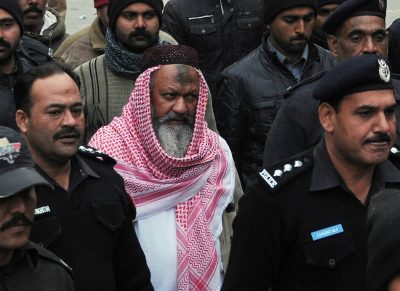By
Sattar Rind
Malik Ishaq, a terrorist who specifically killed Shiite Muslims, was on 29 July 2015 killed in a police encounter with his two sons and other commanders in the northern district of Muzfargarh in the Punjab province of Pakistan. He was one of the founders of the Sectarian party Sipah-e-Sahaba Pakistan (SSP) along with its first leader Haq Nawaz Jhangvi.
The party was created by the Sheikh businessmen’s group of the Jhang district against a Shiite Feudal lord lady politician and ex-ambassador to the USA, Syeda Abida Hussain, as she was deemed unbeatable in the election, the Sheikh group interested in creating a space for their politics to win a seat in the legislative National or Provincial Assembly from the same constituency. This has been claimed by Abida Hussain herself in a recent TV an interview.
It was 1979, the time of the Iranian Revolution; Haq Nawaz Jhangvi began attacking the Islamic Republic of Iran, accusing it of exporting its revolution. He directed his attacks against Shiite beliefs and rituals, as well as against Ayatollah Khomeini, Iran’s Supreme Leader. He received a lot support from the then General Zia, in addition to the kingdom of Saudi Arabia kingdom, declaring Shiite Muslims as non Muslim and that they must be killed, those doing so being applicable to go to heaven after death.
Haq Nawaz Jhangvi somehow became popular and won the seat at the National Assembly from the Jhang district. However on February 23 1990, Jhangvi was killed in a retaliatory bomb attack by a suspected Shiite militant. When Jhangvi was assassinated Zia-ur-Rehman Farooqi assumed leadership of the party /group. Farooqi was also killed in a bomb explosion on January 19 1997 at the Lahore Session Court.
Following his death, Azam Tariq led the group until October 2003, when he was also killed in an attack widely attributed to the militant Shiites organisation Sipah-e-Muhammad, along with four others near to Islamabad. He was the elected member of the National Assembly.
For the period of Azam Tariq’s leadeship another group had been formed under the leadership of Riaz Basra, Malik Ishaq and Akram Lahori in 1996 under the name Lashkar-e-Jhangvi (LeJ), following that of Haq Nawaz Jhangvi, the founder member of the sectarian organisation SSP. Blame was aimed at Azam Tariq, leading to him deviating from the original program of Haq Nawaz Jhanvi.
All three became synonyms of terrorism having killed thousands of Shiite Muslims and Ahmedi people whom Zulfqar Ali Bhutto had previously declared non Muslim after the long historical conflicted riots in Lahore.
The LeJ group specifically targeted the Shiite Doctors, Police officers, Judges, lawyers or any important Shiite Muslim figures including the Iranian diplomat Sadeq Ganji in 1990. In the case of the Iranian Diplomat’s murder, Riaz Basra was arrested in 1992 and sentenced to death for killing Ganji, but escaped from prison in 1994.
They had also killed a number of Shiite Muslims of the Hazara community, people of Quetta and Shiite pilgrims who used to go to Iran and Iraq to pay respect to Karbala and Najaf in Iraq and Iran.
Akram Lahori and Riaz Basra remained underground throughout their period of killing as they were the most wanted by lawmakers.
LeJ has also been linked to Al Qaeda and the Taliban along with many Central Asian and Pakistani originated terrorist groups such as the Jundallah, a dangerous terrorist group operating mainly in Baluchistan along the Iranian border.
In the past, whenever LeJ came under heavy pressure by the Pakistani law enforcement agencies they crossed the border to get shelter and training in Afghanistan under the Taliban. Nevertheless both Akram Lahori and Riaz Basra were both killed in police encounters, dates not being clear, but are assumed to have been killed before the end of 2002.
Malik Ishaq was detained a number of times but no one come forward to provide evidence against him. Most of the time he had threatened judges that he knows them and members of their families very well and used to call their names openly in court. The US State had also declared him their most wanted terrorist.
Thus from the three years Malik Ishaq was in detention and released in December 2014, he continued killing Shiites until he himself was killed in a police encounter on July 29 with the Counter Terrorism Department (CTD). From this, a terrorist who killed a number of innocent Muslims himself came to an end.
This was monumental news, although no one knows exactly what happened, he appears to have been killed in a planned operation following the recent state decision to no longer bear terrorism. If this is true then it is hopeful news for the Pakistani people.
This is what Pakistan needs on a greater level. The aforementioned deceased leaders were all educated by the Pakistani Madrasas. This is an alarming point that needs to be addressed by the authorities which should in turn prevent the funding of these Madrasas.



No Comments Yet!
You can be first to comment this post!